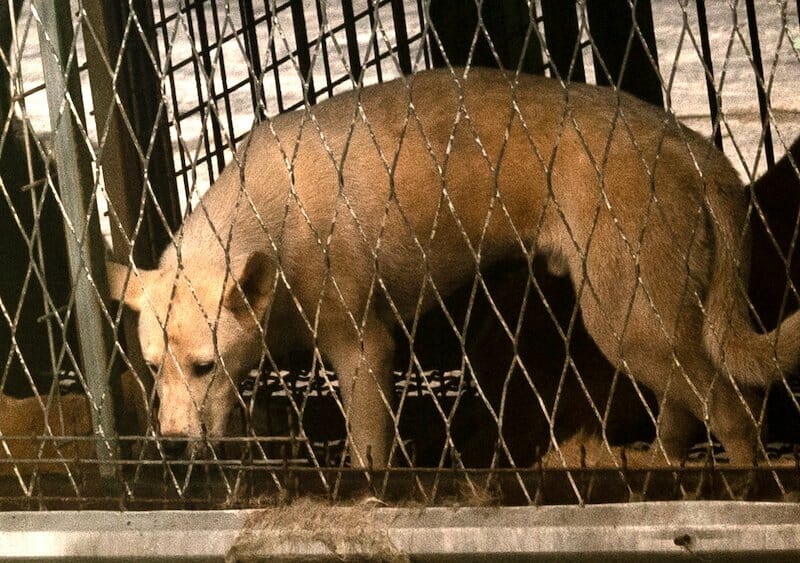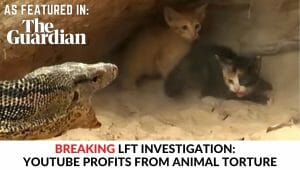Intense pressure. Isolation. The need to witness brutality and death on a daily basis — and stay silent.
Those were the working conditions facing Erin Wing, a then 24-year-old Hispanic woman wanting to make a difference for animals, when she applied to become an animal cruelty investigator for Animal Outlook.
“What I heard a lot of was actually, ‘Do you really want to do this? Maybe you should rethink this decision,’” Wing recalled. “The staff actually tried to convince me not to do this work because it is so intense. But I felt I was needed there.”
Nina Jackel, founder and president of Lady Freethinker (LFT), is no stranger to these horrifying conditions. She also has to bear witness daily to brutal images and reports of animal cruelty to help bring light to the horrors of abuse.
“The hardest thing, hands down, is dealing with viewing animal cruelty all the time,” Jackel said. “There’s never so much of a barrier that you ever stop having empathy for the animals. But the mission is more important to me than anything, and that’s what keeps me going.”
The animal cruelty investigations team at Pasado’s Safe Haven, a nonprofit animal sanctuary and rescue in Washington, pulls hundreds of dogs, cats, and farm animals from cases involving medical neglect, violence, hoarding, animal fighting, bestiality, and a seemingly endless cycle of other abuses.
“It’s not a job that’s ever going to give you the feeling that you’re finished at the end of the day,” Pasado’s investigator and director of animal cruelty operations noted. “You’re never finished.”
(Lady Freethinker is not naming the investigator, who still is active in field work, as doing so could jeopardize operations and her safety.)
All three animal cruelty investigators said their work can be infuriating, emotionally draining, and never-ending. But they also all said it’s important and fulfilling, and they’ve found solace knowing the work they do each day makes a difference.
Animal Outlook: Going Undercover for Animals
Wing said her upbringing both inspired and prepared her to dedicate her life to compassionate action for others.
She grew up in a single-parent household in a low-income area where she both witnessed and endured violence. She felt an early connection to animals, who always greeted her with friendliness and joy.
“I knew they could feel pain,” she said. “Whenever I witnessed an animal being abused, I intervened.”
It’s ironic that intervening became the one thing Wing couldn’t do after she accepted a job as an animal cruelty investigator with Animal Outlook.
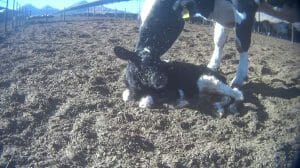
Disturbing undercover footage of a calf covered in flies at Dick Van Dam farm. (Image Credit: Animal Outlook)
In two years, she worked undercover at four facilities, including aquaculture, factory, and family-owned farms. During that time, it was critical for Wing to keep her composure — and her cover — as she watched fish slammed into concrete floors, chicks impaled, and calves brutally de-budded.
“I had to be a chameleon. I had to blend in,” she said. “You go to these facilities, and you can’t be yourself. You can’t form friendships. Your heart aches for these animals, but your job is to document what’s happening. If you blow your cover, if you intervene, then no one gets that inside view of what is really happening.”
At her last assignment, Wing spent two months at the Dick Van Dam family-owned dairy farm in Southern California as a night milker. She’d wake around 5 p.m. for her shift and drive to the farm site — where she was the only female worker — and work until the early hours of the morning.
Afterward, she’d try to coax herself to sleep. But often, she couldn’t. Images of what she witnessed during the day floated around in her mind. She also struggled to eat and rapidly lost weight.
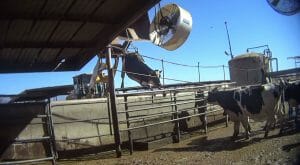
Concerned cows watched as a frightened downer cow was lifted by her pelvis and dangled 20 ft in the air. (Image Credit: Animal Outlook)
The toll was so intense that after she got the footage she needed, she decided to leave the field and take on a new role at Animal Outlook instead.
“I was not at my healthiest,” she said. “With each assignment, there started to be cracks in the concrete barrier I had built up around myself. At the last, there were so many cracks that I felt the dam was going to break.”
Stepping out of the shadows allowed Wing to speak up, for the first time in years, about what she had witnessed.
Her undercover footage at Dick Van Dam revealed newborn calves left in the hot sun to die, sick and injured cows dragged by their hips over concrete, and terrified animals lifted 20 feet into the air by tractors.
Wing also reported that other cows were repeatedly beaten, jabbed, and shocked by workers in acts of “extreme aggression” and were also routinely left without medical care for infections and open wounds.
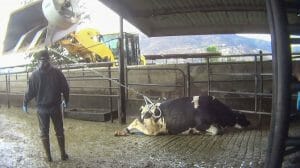
Farm equipment improperly used to drag collapsed cows (Image Credit: Animal Outlook)
The Dairy Farmers of America dropped the farm as a supplier following the publication of the investigation’s results. The New York Times picked up the investigation, asking its thousands of readers to ponder whether dairy farming is inherently cruel to cows.
And Samuel, a sweet male calf, has a new home at the California-based farm animal sanctuary Animal Place because of Wing’s investigation.
Those successes all speak to the power of undercover video as an investigative tool to demand accountability for companies that benefit off of animal exploitation, Wing said.
“Undercover footage shows what is really happening when no one is looking, and that has brought so much change,” she said. “Bearing witness is a very powerful thing that people can do for these animals, who are trapped in a system where they have no voice and are behind closed doors.”
In addition to turning hidden cameras into instruments of truth, Animal Outlook also makes a difference for animals through legal advocacy, a compassionate action magazine, and corporate engagement.
Lady Freethinker: Petitioning for Progress
12-year-old Nina Jackel sat on a stairwell with her beloved dog Peggy when she made the decision to stop eating meat forever.
Soon after, she saw an ad from an animal rights organization with a monkey being experimented on — an experience that became a pivotal moment in her animal rights career.
“That was probably the moment I was introduced to the idea of animal cruelty,” she said. “I was so horrified by it. I was still too young to be deep into activism, but that made me more conscious.”
Early sparks grew into a blaze after Jackel started working as a writer and campaign director for the animal rights nonprofit Last Chance for Animals, which opened her eyes to the depths of animals suffering largely in silence. While working full-time, she still managed to start Lady Freethinker (LFT) as her personal blog.
“I’d work all day, and then come home and work on Lady Freethinker until about 10 o’clock at night,” she said.
LFT blossomed under Jackel’s leadership into a three-pronged approach to exposing animal cruelty: undercover investigations, petitions for public engagement and accountability, and educational awareness through animal-related news stories.
Jackel works with undercover animal cruelty investigators worldwide — including in China, Indonesia, and South Korea — to expose merciless, on-the-ground circumstances and catalyze change.
She said one of LFT’s biggest successes was when a dog abuser in Chile — caught on camera by LFT’s undercover reporter — received the country’s harshest and longest animal cruelty sentence in history.
Another highlight happened when South Korea’s mayor issued orders to demolish the dog-meat-dealing Nakwon Auction House, following an undercover LFT investigation.
“Success in an investigation to me is progress in the way animals are treated,” Jackel said.
Lady Freethinker investigations have uncovered more than 200 dogs sold for slaughter amid the S. Korean Bok Nal Dog Eating Days festivals, elephants scarred from vicious bullhooks at the Mason Elephant Park in Bali, and thousands of animal cruelty videos posted on YouTube, in direct violation of the video sharing platform’s Community Standards.
The investigations made international headlines — gaining coverage in The Guardian, People, Vice, and the Daily Mail — and inspired awareness and action.
Jackel, a former reporter, also uses the power of media to leverage what she sees as people’s inherent love for animals to inspire members of the public to engage and demand accountability.
Last year, Lady Freethinker mobilized more than 6 million petition signatures, including more than 100,000 signatures to stop the gruesome Yulin Dog Meat Festival in China.
“Petitions and undercover work have the same goal of raising awareness and outrage,” Jackel said. “When people are outraged and know that something is intolerable, then things will change. The petitions give people a platform for their voices and force people in power to listen.”
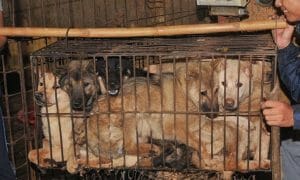
Image Credit: Alamy
Jackel’s days are a whirlwind from start to finish, spent flagging breaking animal-related news for LFT’s writers, editing stories, reaching out to partners, and checking on the organization’s multiple projects.
But a day spent working for the animals is a good day, Jackel said.
“I am so grateful to be able to do the work I love every day,” she said. “We have such amazing supporters and followers. They speak out and donate, and when they donate, it allows us to keep doing investigations, to stop dog meat in Mali, and all the other things we do.”
Pasado’s Safe Haven: Rescuing Animals From Abusive Situations
Pasado’s director of investigations also had an early connection to animals; she started volunteering in a veterinary hospital at age 11.
Her passion for animals drove her into the realms of veterinary medicine, animal rescue, wildlife rehabilitation, and conservation. She’s also taken an extensive number of animal-cruelty-related courses through the Law Enforcement Training Institute in Missouri.
Those experiences helped prepare her for the difficult animal cruelty work she does now.
While there’s no such thing as a “typical” day at Pasado’s, the investigator said she spends a large part of each day fielding, filing, and organizing cruelty complaints.
Pasado’s animal cruelty team responds to complaints and reports of animal cruelty statewide and also follows all of its animal cases through prosecution — a unique and impressive accomplishment for the small team.
“I have my cell phone on me 24/7, so I am always available, and there’s not a time we won’t help if the matter is urgent,” the investigator said. “I am also with the case from beginning to end, pushing on prosecutors constantly to make sure these cases don’t die.”
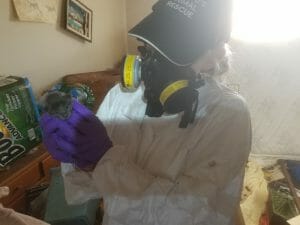
A kitten rescued by Pasado’s Safe Haven. (Image Credit: Pasado’s Safe Haven)
Another part of her job is training law enforcement officers and prosecutors, many of whom aren’t well-versed in the state’s animal cruelty laws.
She recalled one case where an officer who responded to a case where a cat died threw the cat’s body into a dumpster.
“That was the evidence,” she said. “When I asked him about it, he told me, ‘I can’t put this next to my sandwich in the patrol room.’ That’s what he said.”
Pasado’s has added equipping under-resourced law enforcement agencies with evidence freezers to its long list of other services. The investigator noted that having detailed information at each stage — from officers’ logging evidence to prosecutors’ knowing what criminal statutes could apply — is critical to ensuring justice for animals.
Justice is difficult to serve, especially when agencies put precedence on abusers’ conditions over animals’ suffering.
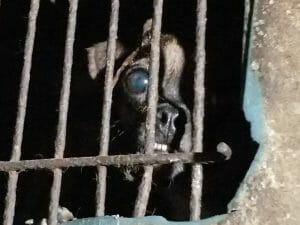
A dog rescued lived its life in a cage until rescued by Pasado’s Safe Haven staff (Image Credit: Pasado’s Safe Haven)
In two recent cat hoarding cases in Yakima County, Wash., Pasado’s staff rescued more than 80 cats from feces-filled homes where dozens of other cats had died. While the cats and kittens are recovering, law enforcement and the county’s prosecuting attorney declined pressing charges because the cat guardians were elderly individuals.
Pasado’s investigator said her team ran into a similar frustration when a separate law enforcement agency told her his staff wasn’t going to go after another individual, with well-documented abuse of animals, because the person had cancer.
“You do all this work, you see the animals suffer, you spend thousands of dollars to get animals recovered, and the offenders get nothing,” the investigator said. “That is the most frustrating part; when people are not held accountable.”
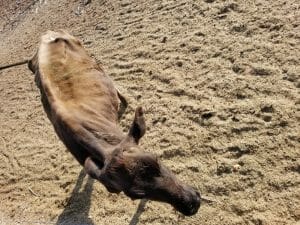
Pasado’s Safe Haven rescues hundreds of dogs, cats, and farm animal from abusive situations like this one each year (Image Credit: Pasado’s Safe Haven)
But the victories make the struggles worth the effort, she added.
“When I get a strong conviction, the animals are out and safe and the person is held accountable, that is success to me,” she said.
Last year, Pasado’s provided training for 10 prosecutors and 28 animal control officers, covering 31 jurisdictions and eight counties. They investigated 168 cases of animal cruelty, rescuing both individual animals and dozens of animals from multiple large scale rescues.
They also supported the care and recovery of 225 animals at their sanctuary near Sultan, Wash., and adopted 156 sanctuary residents into loving forever homes.
“I’m grateful that people call in these cases of animal cruelty,” the investigator said. “I know it can be scary and uncomfortable. But these are truly voiceless victims, and the only reason we can respond is because people report.”
A Quick Q &A: Words of Wisdom For Would-Be Activists
Lady Freethinker asked the three animal cruelty investigators what advice they have for people who might want to join their efforts in the field, as well as for those who want to make a difference but aren’t sure that becoming an animal cruelty investigator is right for them.
Erin Wing (Animal Outlook): There is a tremendous need to make sure you pay attention to the state of your mental health. It’s important that you be 100% at your best for the animals, because they need and deserve that. You don’t want to compromise this aspect of the Animal Rights movement. It is so important to realize when enough is enough. There are so many other ways to contribute: Be vegan; spread the word about what is happening; donate to the organizations doing the work that you admire.
Nina Jackel (Lady Freethinker): For people who want to start their own animal rights nonprofit, I would definitely recommend working for a nonprofit first. Get involved before making a huge leap. For someone who thinks it’s too overwhelming, start small. Try Meatless Mondays. Share a post. There’s always something little that you can do, and the small steps make a big change. You don’t need a lot to make a difference. You need a little bit of luck, but it’s mostly dedication.
Animal Cruelty Investigator (Pasado’s Safe Haven): Experience is so important. Get as much experience in the field of animal care and animal rescue as you can. There are some great opportunities out there, including through the ASPCA’s Field Investigative Response team and the American Humane Red Star team. If you don’t think it’s right for you, every organization, including ours, has so many ways you can help. Donate. Volunteer.

